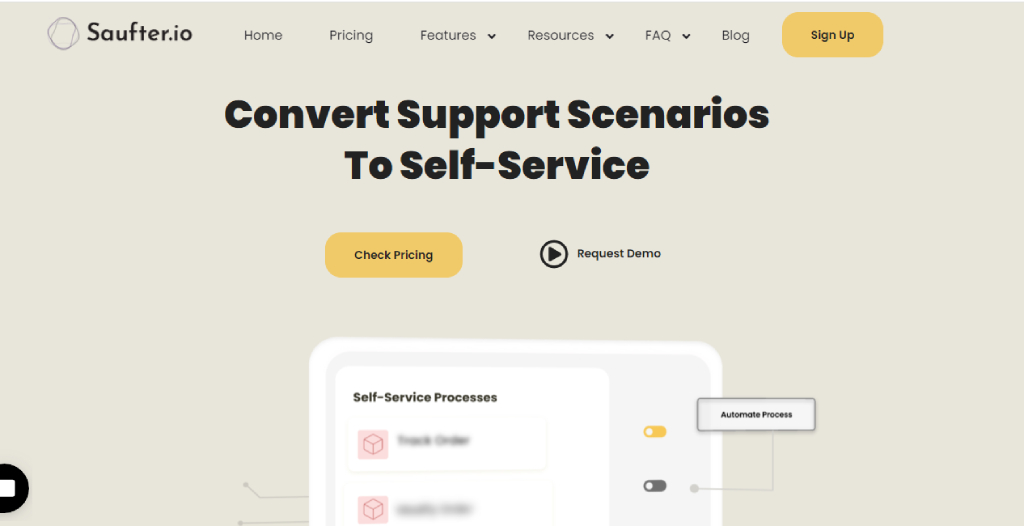Last Updated: July 2025
Cin7 Orderhive is a multi-channel inventory management software with the primary goal to help retailers and sellers simplify their back-end tasks.
But… One major issue with Orderhive is the inability to integrate with many e-commerce platforms such as Magento and ShipStation. Some core features are unavailable. For instance, custom invoices, a core functionality, stopped working after a platform update
Moreover, Orderhive’s customer support has been slow on occasion. Some queries get unanswered, and only the basic requirements work faultlessly.
So, if you’re looking for Orderhive Alternatives, we can help you choose the best one out of the Top 10 Orderhive alternatives listed in this post.
In this post, we will look at:
6 Reasons to look for an Orderhive Alternative
- Issues with updating: Information integrated with some carriers like FedEx, USPS, etc. takes time to be updated as shipments are delivered.
- Limited Access to features: Many features are accessible only to system admins.
- Bugs: There are many unexpected bugs. Integration with QuickBooks, another similar tool, is faulty. Tracking numbers do not automatically update from ShipStation to your channels, which means you’d have to do it manually, risking late shipments or account deactivation. There is no Auto Sum option available, so you’d have to manually calculate the sales and revenue.
- Missing orders: It’s difficult to retrieve information about orders that go missing.
- Poor Analytics tool: An improvement in their prediction systems is needed to improve stock levels and deliverability of out-of-stock items. Customization of reports is not very user-friendly.
- Customer support issues: Some features from older versions are missing in newer ones. Support reply is fast but the rectification of issues is very slow. Chat support is not helpful for complicated queries.
Orderhive Alternatives: Price Comparison
Alternative | Pricing starts at | Pricing limitations |
| Saufter | Custom pricing | – Includes up to 3 users, +$29/month for each extra user – Automated returns center and automated center for order delivery issues available from pro plan |
| Zoho Inventory | Free; Standard ($59 per organization per month) | 1500 orders per month, 2 warehouses, and 3 users with the Standard plan |
| Fishbowl Inventory | $4395 (one-time payment) | – No monthly or yearly pricing plans – Non-expiring licenses but include one year of maintenance and support |
| ShipStation | Starter ($9.99 per month) | 50 shipments per month and only 1 user |
| Finale Inventory | Starter ($75 per month) | 500 included orders per month and only 1 user |
| QuickBooks Commerce | Founder ($39 per month) | 10 sales orders per month and only 1 user |
| Katana | Essential ($99 per month) | 3 warehouses, up to 500 shipped sales order lines per month and 1 full-access user |
| Veeqo | Accelerator ($195 per month) | 500 orders and 2 users included |
| DEAR Systems | Standard ($325 per month) | 2 e-commerce and app integrations plus 5 users |
| Webgility | Plus ($99 per month billed annually) | Up to 6000 annual orders, 1 sales channel and 1 user |
Top 10 Orderhive Alternatives
- Saufter
- Zoho Inventory
- Fishbowl Inventory
- ShipStation
- Finale Inventory
- QuickBooks Commerce
- Katana
- Veeqo
- DEAR Systems
- Webgility
1. Saufter

Saufter is a multipurpose helpdesk and automation software that allows you to view in one spot when an order was placed, returned or when the return was requested.
Moreover, it comes with an in-built portal to automate returns and exchanges. Your customers can choose the items they wish to return and then place an exchange order, based on your policies.
In the pro plan, it can Detect delays and issues with your customers’ orders automatically and resolve them.
Aside from that, you also get native social media integration (with a seamlessly integrated support experience on each platform), integration with popular e-commerce platforms such as Shopify, customized live chat widgets, and AI-drafted emails.
Pros:
- Automated self-service returns center for customers
- Automated orders scanning for delays
- Allows you to automate the collection of reviews and UGC
- Knowledge base
- Native Shopify/Woocommerce/Magento Integration
Cons:
- No options to manage inventory
2. Zoho Inventory (Overall Ratings ⭐4.3/5, 66 reviews)

Zoho Inventory is a cloud-based inventory management software that helps you create and manage both your sales and purchase orders, and track your inventory. It permits multi-channel selling and shipping integrations, from purchase to packing to payments.
You can easily customize the invoices as per the country-specific requirements using Zoho Inventory. Compatible with Zoho Books and Zoho CRM, it is also consistent with other accounting tools.
Pros:
- Easy to set-up and use with an intuitive interface
- Provides detailed information about the stock and makes it possible to check the pace of inventory in real time
- Helps in the creation of sales strategies
Cons:
- Workarounds needed for manufacturing companies so as to tailor it to their specific needs
- Only a single product can be received against a single purchase order at a time
3. Fishbowl Inventory (Overall ratings: 4/5⭐, 180 reviews)

Fishbowl Inventory is “the ideal manufacturing and warehouse management solution designed for small to medium size businesses.” Its key features include inventory management, Material Requirements Planning (MRP), job shop floor control, work order management, manufacturer orders and bills of materials, barcoding and so much more.
The solution can be deployed on-premise or hosted in the cloud.
Pros:
- Customer service that goes the extra mile
- Solid integrations with QuickBooks and multiple shipping companies
- Easy from an administrator’s perspective
Cons:
- Some integrations are challenging and do not work
- Limited ability to get custom reports directly
- There is a steep learning curve to make use of all the features
4. ShipStation (Overall ratings: 4.3/5⭐, 179 reviews)

ShipStation is a shipping and order web application that integrates with over 150 of the most popular marketplaces, shopping carts, and carriers. Plus, you can have as many selling channels and carriers as you need.
With ShipStation, you get up to 40% off on USPS rates, and 29% off on FedEx rates. You also get a branded tracking page and returns portal, and customizable automation rules to prevent shipping errors and cut your shipping time in half.
Pros:
- Eliminates errors involved in manual processing by pushing everything online
- Continuous improvements to the technology
- Pre-existing API connections to all major e-commerce channels
Cons:
- Somewhat disappointing customer service at Tier 1
- Occasional bug when shipping with FedEx
5. Finale Inventory (Overall ratings: 4.7/5⭐, 30 reviews)

Finale Inventory is an “intuitive cloud-based inventory management system that is easy to use while designed to scale to the demands of a growing business.” It can handle all your stock movements from purchasing to sales.
You are also guaranteed a comprehensive solution for multi-channel e-commerce retailers. Combined with barcode scanning hardware, it makes for an elaborate warehouse management solution.
Pros:
- Very customizable
- Easy to create invoices and pull up a customer’s complete order history
- Many functions and possibilities for integration
Cons:
- Questionable inventory management as it involves scans that are manually synced
- Not enough detail in the reports
- Slow initial data loading
6. QuickBooks Commerce (Overall ratings: 3.8/5⭐, 15 reviews)

QuickBooks Commerce is a powerful cloud-based inventory and order management tool for modern online businesses. Combining manufacturing, sales channels, inventory locations, and currencies allows you to manage every product, order, and customer in one place.
Pros:
- Good interface and gradual learning curve to start working with QuickBooks
- Easy to set up native integrations
- Easy to set-up integrations with other vendor platforms
Cons:
- Many workarounds needed to get some features going
- Lacks warehouse managing features and barcode scanning
- Lacks a proper work-flow that matches real-life processes
7. Katana (Overall ratings: 4.4/5⭐, 24 reviews)

Katana is a manufacturing ERP (Enterprise Resource Planning) that gives you a live look at your business, including live inventory and manufacturing management, batch tracking for end-to-end traceability, a Shop Floor App for total floor-level control, open API and a growing channel partner network.
Real-time master planning features automate resource allocation based on prioritized sales orders and integrations with e-commerce, accounting, CRM (Customer Relationship Management), and reporting services to centralize your operations in one visual platform.
Pros:
- Flawless integration and connectivity capabilities
- Support service that resolves queries in record time
- Amazing knowledge base
Cons:
- Single account per subscription
- High price compared to its peers
- Requires a more advanced reporting system and analytics engine
8. Veeqo (Overall ratings: 4.4/5⭐, 17 reviews)

Veeqo is an all-in-one platform that gives sellers unprecedented visibility and control over their orders, inventory, picking, shipping, purchasing, and reporting. It is built on 30+ e-commerce and shipping integrations.
With in-built demand forecasting, purchasing, and returns handling, Veeqo is a platform that unifies your inventory, warehouse and fulfillment.
Pros:
- Integrates quite well with most e-commerce platforms via simple processes
- Easy to comprehend articles available in the help-center
- Easy to navigate UI
Cons:
- Integration with Woocommerce not as smooth as one expects
- Setting up is a time-consuming process
- Setting up the product catalog was time-consuming
9. DEAR Systems (Overall ratings: 3.2/5⭐, 14 reviews)

DEAR Systems makes enterprise-level inventory management, manufacturing, sales integration, reporting, and automation accessible to all businesses. It keeps the moving parts of your business all in one location, while automating time-consuming tasks.
You can manage orders from multiple channels, including e-commerce channels with automations and great integrations. Track stock levels and stock on hand value for raw materials, components, finished goods, and more.
Pros:
- A lot of customization is offered
- Fair price and nice UI
- Possible to track your stock completely
Cons:
- Troubleshooting is occasionally difficult due to the complexity
- So much to the product that it can be overwhelming
- Not backwards compatible with QuickBooks
10. Webgility (Overall ratings: 4.5/5⭐, 278 reviews)

Webgility is “the most flexible, powerful and easy-to-use software to automate accounting for online businesses. Data is synchronized automatically and securely across all your sales channels.”
It also delivers real-time insights to an intuitive performance analytics dashboard. Besides being very detail-oriented, it is reliable and comes with great support.
Pros:
- Helps automate invoicing by connecting multiple marketplaces
- Terrific customer support, going above and beyond the call of duty
Cons:
- Somewhat complicated implementation due to the high level of functionalities or options
- A lack of a self-service option when it comes to resolving customer queries
- The process of updating the modules is time-consuming
Conclusion
So, these are the top orderhive alternatives you can choose from.
In a nutshell, you can pick an orderhive alternatives that meets your unique business needs. Toward that end, we recommend you look at the pricing plans plus the unique features mentioned here and then sign up for a free trial before shifting to an alternative.
If you’re still unsure, feel free to contact our specialized team for more information.
Or… You can try Saufter for free. It can help you automate order scanning, returns, and review collection along with providing great customer support to your customers.

















